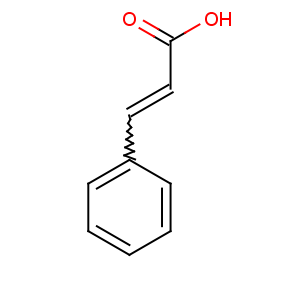Title: Cinnamic Acid
CAS Registry Number: 621-82-9
CAS Name: 3-Phenyl-2-propenoic acid
Synonyms: b-phenylacrylic acid
Molecular Formula: C9H8O2
Molecular Weight: 148.16
Percent Composition: C 72.96%, H 5.44%, O 21.60%
Literature References: Occurs as the
trans-form in storax, balsam Peru or Tolu, oil of cinnamon, coca leaves. Isoln: Beilstein, Kuhlberg,
Ann. 163, 123 (1872); von Miller,
Ann. 188, 196 (1877). Synthesis (Perkin reaction) from benzaldehyde, acetic anhydride, and potassium acetate:
Org. React. I, 248 (1942); from oxalyl bromide + styrene: Treibs
et al., Naturwissenschaften 45, 85 (1958); from acetylene + benzaldehyde: Herbetz,
Ber. 92, 541 (1959). Prepn of
cis- and
trans-isomers: Comte
et al., Compt. Rend. 245, 1144 (1957). Isoln from wood-rotting fungus,
Stereum subpileatum Berk. & Curt.: Birkinshaw
et al., Biochem. J. 66, 188 (1957). Review of risk assessment as fragrance ingredient: D. Bickers
et al., Food Chem. Toxicol. 43, 799-836 (2005); of toxicology: C. S. Letizia
et al., ibid. 925-943.
Properties: Monoclinic crystals, honey, floral odor, d44 1.2475. mp 134°; bp3 147°. Flash point, closed cup: >93.3°C. Distilling at 146° causes decarboxylation to styrene. pK (25°) 4.46. uv max (alc): 273 nm. One gram dissolves in about 2000 ml water at 25° (more sol in hot water), in 6 ml alc, 5 ml methanol, 12 ml chloroform. Freely sol in benzene, ether, acetone, glacial acetic acid, carbon disulfide, oils. The alkali salts are sol in water. LD50 (g/kg): 3.57 orally in rats; >5.0 dermally in rabbits (Letizia).
Melting point: mp 134°
Boiling point: bp3 147°
Flash point: Flash point, closed cup: >93.3°C
pKa: pK (25°) 4.46
Absorption maximum: uv max (alc): 273 nm
Density: d44 1.2475
Toxicity data: LD50 (g/kg): 3.57 orally in rats; >5.0 dermally in rabbits (Letizia)
Derivative Type: Methyl ester
CAS Registry Number: 103-26-4
Molecular Formula: C10H10O2
Molecular Weight: 162.19
Percent Composition: C 74.05%, H 6.21%, O 19.73%
Properties: Crystals, odor fruity and balsamic, reminiscent of strawberries. mp 36°. d036 1.042. bp 261.9°; bp15 132.5-134°.
nD21 1.5766. Freely sol in alcohol, ether. Practically insol in water. Clearly sol in 80% alc.
Melting point: mp 36°
Boiling point: bp 261.9°; bp15 132.5-134°
Index of refraction: nD21 1.5766
Density: d036 1.042
Derivative Type: Ethyl ester
CAS Registry Number: 103-36-6
Synonyms: Ethyl cinnamate; ethyl phenylacrylate
Molecular Formula: C11H12O2
Molecular Weight: 176.21
Percent Composition: C 74.98%, H 6.86%, O 18.16%
Properties: Almost colorless, oily liquid, fruity and balsamic odor, reminiscent of cinnamon with an amber note. d2525 1.045-1.048. d420 1.049. bp 271°. mp 6-10°.
nD20 1.559-1.561. Miscible with alcohol, ether. Insol in water. Soluble in 3 vols of 70% alc.
Melting point: mp 6-10°
Boiling point: bp 271°
Index of refraction: nD20 1.559-1.561
Density: d2525 1.045-1.048; d420 1.049
Derivative Type: n-Butyl ester
CAS Registry Number: 538-65-8
Synonyms: Butyl cinnamate
Trademarks: Eliminoxy
Molecular Formula: C13H16O2
Molecular Weight: 204.26
Percent Composition: C 76.44%, H 7.90%, O 15.67%
Properties: Liquid, agreeable ethereal odor when pure. bp13 145°. d418 1.012. Very sparingly sol in water (<0.5%). Sol in 95% alc, ether, acetone, chloroform, benzene. Incompatible with alkalies; stable to light, air, and storage temps.
Boiling point: bp13 145°
Density: d418 1.012
Derivative Type: Anhydride
CAS Registry Number: 538-56-7
Synonyms: Cinnamic anhydride
Molecular Formula: C18H14O3
Molecular Weight: 278.30
Percent Composition: C 77.68%, H 5.07%, O 17.25%
Properties: Crystals, mp 136°. Practically insol in water. Freely sol in warm benzene; slightly sol in alc.
Melting point: mp 136°
Use: Fragrance and flavoring ingredient.

